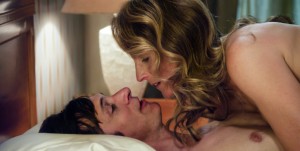[Note: An original version of this post appeared on www.moviewallas.com]
The Toronto International Film Festival was in progress when 9/11 happened. TIFF takes place in the first two weeks of September, and since 2001 the festival has showed a short two minute memorial prior to every feature screened on September 11th. Over the years, the short has changed, but it has always been a well crafted piece consisting of reactions to 9/11 from the film community. And 2012 was the first year that the festival chose not to show a 9/11 tribute. There was some curiosity around this amongst a few people I spoke with today. Most individuals, including myself, believe this was a deliberate decision, to demonstrate a small manner of healing that has occurred since the events of 2001. And that while 9/11 can never be forgotten, the world has learned to move on a little bit. This is oddly comforting.
All of the films I saw today seemed to deal with matters of the flesh in some form or another.
Byzantium, the latest from director Neil Jordan (The Company Of Wolves, The Crying Game, Interview With A Vampire, The End Of The Affair) stars Saoirse Ronan and Gemma Atherton as contemporary blood-suckers. For a film about vampires, I found the movie oddly bloodless. To be clear, there is a surfeit of blood and gore on screen, but the film seemed to me lacking in dramatic tension. I respect the decision to have the movie be as much about atmosphere as the plot, but the terminally sluggish placing seemed a peculiar choice. The movie dips back periodically to a back-story set two hundred years in the past, but the back and forth in chronology isn't effective since that origin story about the two vampires is not particularly compelling. I am hardly an expert on the mythology of vampires, but I am fascinated by the belief that vampires in literature have always been a metaphor for all those in the world who are patently different. And therefore subject to scorn and hatred. This theory also explains the need for vampires to stay in dark. It has been suggested that vampires in early literature were meant to represent lepers. There has been discussion that the vampires in Anne Rice's books represent homosexual repression. Others have suggested that the reaction to vampires has long represented racism in the world. Considering that the director of Interview With A Vampire is returning 20 years later with Byzantium, I was hoping he had something more to add to the mythology of blood-suckers. But I struggled to find any meaningful insight in Byzantium and surprised to see it be so toothless. Yes, he comments on how vampires have traditionally been male and the two female protagonists in this film are pariahs even within the vampire clan. But even that protest comes across a bit outdated. Saoirse Ronan is one of the more intriguing screen presences in current cinema and does a very able job here but even so seems underused. This is a technically accomplished film, but considering that it is clearly meant to be more than just pure entertainment, it was a bit of head-scratcher for me.
The Sessions comes to TIFF already having gathered buzz at prior film festivals as the movie guaranteed to earn acting nominations for John Hawkes and Helen Hunt. I am not going to argue about that having seen the film. In fact, it is best if this film is seen with the minimum of expectations. This is a small-scale film that evokes some big issues. The movie is based on the real-life story of Mark O'Brian, a Berkeley area poet/journalist, who after being afflicted with childhood polio, needed to live in an iron lung and had no useable motor movements below his neck. Confined to a stretcher all his adult life, and with caretakers around him to help him with everyday activities, Mark O'Brian went on to obtain his degree. Obviously unable to do many things that others can, he realized in his mid-thirties that the one thing he could not live without having accomplished in his life was to have a physical relationship. The movie begins at this point in his life, and covers his relationships with those around him, chiefly with the sex-therapist who tries to assist him with fulfilling his desire to lose his virginity. Helen Hunt plays the therapist in a fearless performance, depicting the complexities of a woman with a husband and son who, as part of her professional career is required to get physically intimate with others. John Hawkes, that menacing and charismatic actor from Winter's Bone and Martha Marcy May Marlene is unrecognizable here in the lead role as a man constantly shrunk down to size in the presence of the medical equipment around him. The film features some stellar writing, especially when it gets into decidedly unchartered territories, and performances that make you forget that you are watching actors. What I liked most about the film though was how it successfully makes the case, on multiple occasions, that many issues that we may consider as being uniquely specific to the physically disabled are actually remarkably universal; the impediments we face in life are not that different regardless of our physical status. This story is also rife for assessing the particular considerations of a professional sex-therapist. What are the ethics, motivations and conflicts associated with a person whose trained work involves having sex with clients and who receives monetary compensation for it (Hunt's character makes it clear, repeatedly, that she is a therapist, not a prostitute)? And when a sex-therapist builds necessarily difficult relationships with the person being treated, how can the physicality of it not bleed over into emotional dependencies? The film explores this to some extent - notably with the shifting attitude of Hunt's husband who initially believes his wife is a saint for what she does to help people, but over a period of time starts resenting her for the same thing - but I wished it had plumbed this further. After all is said and done though, this is an original, intimate, and affecting film.
Truth in advertising! The movie, My Awkward Sexual Adventure, is exactly what the title indicates. This is a silly little sex-comedy, which can sit in your Netflix queue along with the American Pie films. Did I laugh during this film? Yes, many times. And it is perhaps a notch above the sort of teenage raunchfests thrown at us from time to time. In this genre, nobody is looking for high art, or even exceptional insight, and as long as the film isn't inept or does not insult the audience, it is already ahead of the others in the race. The plot involves a man whose girlfriend declines his marriage proposal claiming she finds him boring and his physical skills in bed severely lacking. Through a turn of circumstances, he strikes a deal with a stripper (with a heart of gold? what do you think?) who promises him education with lovemaking in return for him assisting with her failing finances. A homegrown Canadian effort that took almost a decade to bring to the screen, the film is harmless fun. Although the movie does up the ante substantially in the raunch department, the writer and lead actor Jonas Chernick and director Sean Garrity keep things energetic, and the committed actors make this not an unworthy entry in this genre.
Sadly, I have only one more day left at TIFF and will be filing in my final report tomorrow.
The Toronto International Film Festival was in progress when 9/11 happened. TIFF takes place in the first two weeks of September, and since 2001 the festival has showed a short two minute memorial prior to every feature screened on September 11th. Over the years, the short has changed, but it has always been a well crafted piece consisting of reactions to 9/11 from the film community. And 2012 was the first year that the festival chose not to show a 9/11 tribute. There was some curiosity around this amongst a few people I spoke with today. Most individuals, including myself, believe this was a deliberate decision, to demonstrate a small manner of healing that has occurred since the events of 2001. And that while 9/11 can never be forgotten, the world has learned to move on a little bit. This is oddly comforting.
All of the films I saw today seemed to deal with matters of the flesh in some form or another.
Byzantium, the latest from director Neil Jordan (The Company Of Wolves, The Crying Game, Interview With A Vampire, The End Of The Affair) stars Saoirse Ronan and Gemma Atherton as contemporary blood-suckers. For a film about vampires, I found the movie oddly bloodless. To be clear, there is a surfeit of blood and gore on screen, but the film seemed to me lacking in dramatic tension. I respect the decision to have the movie be as much about atmosphere as the plot, but the terminally sluggish placing seemed a peculiar choice. The movie dips back periodically to a back-story set two hundred years in the past, but the back and forth in chronology isn't effective since that origin story about the two vampires is not particularly compelling. I am hardly an expert on the mythology of vampires, but I am fascinated by the belief that vampires in literature have always been a metaphor for all those in the world who are patently different. And therefore subject to scorn and hatred. This theory also explains the need for vampires to stay in dark. It has been suggested that vampires in early literature were meant to represent lepers. There has been discussion that the vampires in Anne Rice's books represent homosexual repression. Others have suggested that the reaction to vampires has long represented racism in the world. Considering that the director of Interview With A Vampire is returning 20 years later with Byzantium, I was hoping he had something more to add to the mythology of blood-suckers. But I struggled to find any meaningful insight in Byzantium and surprised to see it be so toothless. Yes, he comments on how vampires have traditionally been male and the two female protagonists in this film are pariahs even within the vampire clan. But even that protest comes across a bit outdated. Saoirse Ronan is one of the more intriguing screen presences in current cinema and does a very able job here but even so seems underused. This is a technically accomplished film, but considering that it is clearly meant to be more than just pure entertainment, it was a bit of head-scratcher for me.
The Sessions comes to TIFF already having gathered buzz at prior film festivals as the movie guaranteed to earn acting nominations for John Hawkes and Helen Hunt. I am not going to argue about that having seen the film. In fact, it is best if this film is seen with the minimum of expectations. This is a small-scale film that evokes some big issues. The movie is based on the real-life story of Mark O'Brian, a Berkeley area poet/journalist, who after being afflicted with childhood polio, needed to live in an iron lung and had no useable motor movements below his neck. Confined to a stretcher all his adult life, and with caretakers around him to help him with everyday activities, Mark O'Brian went on to obtain his degree. Obviously unable to do many things that others can, he realized in his mid-thirties that the one thing he could not live without having accomplished in his life was to have a physical relationship. The movie begins at this point in his life, and covers his relationships with those around him, chiefly with the sex-therapist who tries to assist him with fulfilling his desire to lose his virginity. Helen Hunt plays the therapist in a fearless performance, depicting the complexities of a woman with a husband and son who, as part of her professional career is required to get physically intimate with others. John Hawkes, that menacing and charismatic actor from Winter's Bone and Martha Marcy May Marlene is unrecognizable here in the lead role as a man constantly shrunk down to size in the presence of the medical equipment around him. The film features some stellar writing, especially when it gets into decidedly unchartered territories, and performances that make you forget that you are watching actors. What I liked most about the film though was how it successfully makes the case, on multiple occasions, that many issues that we may consider as being uniquely specific to the physically disabled are actually remarkably universal; the impediments we face in life are not that different regardless of our physical status. This story is also rife for assessing the particular considerations of a professional sex-therapist. What are the ethics, motivations and conflicts associated with a person whose trained work involves having sex with clients and who receives monetary compensation for it (Hunt's character makes it clear, repeatedly, that she is a therapist, not a prostitute)? And when a sex-therapist builds necessarily difficult relationships with the person being treated, how can the physicality of it not bleed over into emotional dependencies? The film explores this to some extent - notably with the shifting attitude of Hunt's husband who initially believes his wife is a saint for what she does to help people, but over a period of time starts resenting her for the same thing - but I wished it had plumbed this further. After all is said and done though, this is an original, intimate, and affecting film.
Truth in advertising! The movie, My Awkward Sexual Adventure, is exactly what the title indicates. This is a silly little sex-comedy, which can sit in your Netflix queue along with the American Pie films. Did I laugh during this film? Yes, many times. And it is perhaps a notch above the sort of teenage raunchfests thrown at us from time to time. In this genre, nobody is looking for high art, or even exceptional insight, and as long as the film isn't inept or does not insult the audience, it is already ahead of the others in the race. The plot involves a man whose girlfriend declines his marriage proposal claiming she finds him boring and his physical skills in bed severely lacking. Through a turn of circumstances, he strikes a deal with a stripper (with a heart of gold? what do you think?) who promises him education with lovemaking in return for him assisting with her failing finances. A homegrown Canadian effort that took almost a decade to bring to the screen, the film is harmless fun. Although the movie does up the ante substantially in the raunch department, the writer and lead actor Jonas Chernick and director Sean Garrity keep things energetic, and the committed actors make this not an unworthy entry in this genre.
Sadly, I have only one more day left at TIFF and will be filing in my final report tomorrow.




No comments:
Post a Comment